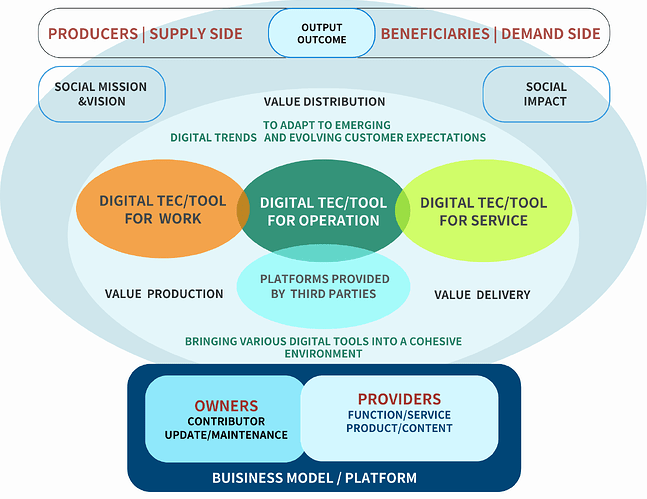Originally published at: New technologies and digitisation
Social economy and social innovation
We believe this is an important report issued by the European Union, which examines the opportunities and challenges presented by digital technologies, tools, and platforms from the perspective of the social economy sector and the social innovation actors within it.
Without a doubt, we can observe numerous successful cases where digital tools and platforms enable social enterprises to collaborate, communicate, and reach wider audiences more effectively. Digital platforms and online markets allow social enterprises to measure and showcase their social impact, enhancing transparency and accountability. They facilitate fundraising efforts, improve operational processes, and provide innovative solutions to social and environmental issues.
Moreover, in many more cases, we see that they offer social enterprises a broader customer base and new sources of revenue. They promote peer-to-peer exchanges, crowdfunding campaigns, and the sharing of resources and knowledge within the social economy ecosystem.
The report identifies the integration of digital tools and technologies as an irreversible trend for social enterprises. Governments, policymakers, and civil society organizations play a crucial role in driving digital innovation, ensuring access to resources and funding, and addressing the digital divide. Social economy enterprises themselves can benefit from supportive policies, capacity-building initiatives, and collaborations with tech partners and stakeholders.
Challenges
However, social enterprises and social innovation projects initiated by large organizations face the challenge of effectively leveraging these opportunities and overcoming operational-level obstacles. Let’s now outline the potential hurdles:
Regarding the challenges, they may include the following:
- Bridging the digital divide among participants.
- Limited access to technological resources or insufficient digital literacy, hindering active participation.
- Ensuring data privacy and security while fostering community engagement and interaction.
- Difficulties in keeping pace with rapidly evolving digital technologies, especially for those with limited resources.
In terms of long-term development, the following issues may arise:
- Rapid technological advancements that disrupt the social economy sector.
- Adapting to evolving customer expectations in response to the changing times.
- Adjusting business models to align with the evolving landscape.
- Embracing emerging digital trends driven by the changing times.
- Integrating digital tools into operational models and enhancing employee skills to facilitate organization-wide digital transformation.
Based on the above content, it is evident that social innovators, starting from the entrepreneurial stage, need to integrate digital tools into their operational models and acquire the necessary skills. They should identify suitable digital tools for each aspect of their operational framework and deploy them in an integrated manner. Additionally, they should proactively address potential challenges and be adaptable to environmental changes.
Key area of social innovation entrepreneurship
We have compiled the following key areas from various operational and work processes in social innovation entrepreneurship:
- Collaboration, communication, and promotion strategies.
- Enhancing work efficiency and effectiveness.
- Sharing of resources and knowledge.
- Management and utilization of data assets.
- Expanding customer base and exploring new revenue streams.
- Reaching a wider audience to increase impact.
- Designing and implementing innovative solutions.
- Optimizing operational processes.
- Designing or improving services and products.
- Strengthening fundraising efforts.
- Facilitating peer-to-peer communication for mutual support, sharing, or crowdfunding activities.
- Measuring and showcasing social impact indicators to enhance transparency and accountability.
Source: https://op.europa.eu/en/publication-detail/-/publication/208a8be9-39d5-11eb-b27b-01aa75ed71a1/language-en
